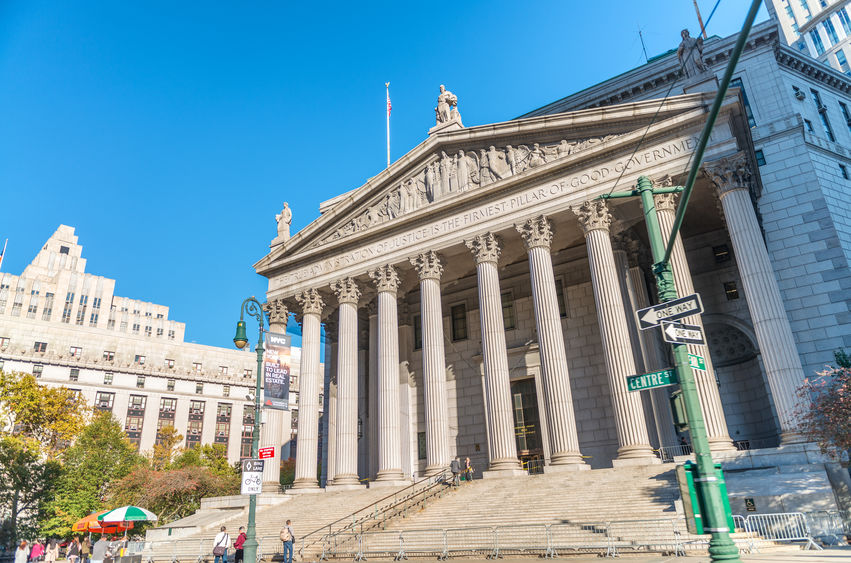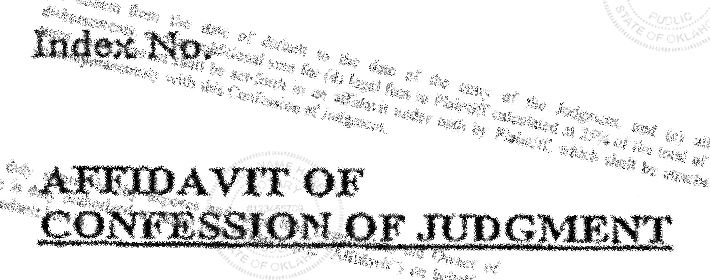Legal Briefs
SEC Secures Judgment Against Direct Lending Investments
June 20, 2019Without admitting or denying the allegations of the complaint, Direct Lending Investments, a defunct online lending hedge fund, consented to judgment by the SEC on Tuesday. They will be required to pay a disgorgement of ill-gotten gains, prejudgment interest, and a civil penalty that has yet to be determined.
SEC, Ruderman Heading to Settlement
June 16, 2019The Securities and Exchange Commission’s motion for summary judgment against Carl Ruderman for his role in the 1 Global Capital case is likely to be stayed as the parties head toward a settlement.
On June 14, the SEC informed the Court that “as a result of mediation and ensuing discussions, the Commission staff and Defendant Carl Ruderman have agreed on a proposed settlement of all claims and relief the Commission seeks against Ruderman.” The settlement has to be approved, however, by the five SEC Commissioners. “If the Commissioners approve Ruderman’s signed settlement agreement, it will resolve the Commission’s litigation against him,” the SEC contends.
The SEC is asking for a 90-day stay.
SEC Seeks Partial Summary Judgment Against Ruderman in 1 Global Capital Case
June 10, 2019The SEC filed a motion for summary judgment against defendant Carl Ruderman last week as part of its ongoing lawsuit against 1 Global Capital and related parties. The motion applies to Ruderman on Count 1 of the SEC’s amended complaint alleging violations of 5(a) and (c) of the Securities Act of 1933 in addition to summary judgment on Ruderman’s second affirmative defense alleging the instruments he and Defendant 1 Global Capital LLC sold were not securities.
Ruderman has until June 18th to file his opposition to the motion.
MCA Company Files 15 COJs Against a Medical Practice, Dispute Arises Over Alleged Forgery
May 29, 2019 A New Jersey physician was one day going about his usual business, and the next day found himself an unwitting judgment debtor for almost $2,000,000 based on more than a dozen forged Confessions of Judgment (COJs) of which he had no knowledge. That’s the scenario described in papers by the physician’s attorney suing New York-based Itria Ventures, LLC. Itria is a subsidiary of its more well known parent company Biz2Credit.
A New Jersey physician was one day going about his usual business, and the next day found himself an unwitting judgment debtor for almost $2,000,000 based on more than a dozen forged Confessions of Judgment (COJs) of which he had no knowledge. That’s the scenario described in papers by the physician’s attorney suing New York-based Itria Ventures, LLC. Itria is a subsidiary of its more well known parent company Biz2Credit.
In the span of 19 months, Itria funded a medical practice 19 times (an average of once a month), putting the practice on the hook for millions of dollars in purchased receivables. In March 2017, Itria declared one of those agreements to be in default and filed a COJ in the Supreme Court of New York, successfully securing a judgment in the amount of $245,114. Despite this, Itria continued to enter into at least 3 more funding contracts with them after defaulting.
The relationship would sour as Itria attempted to enforce its New York judgment in New Jersey with vigor. According to Court papers filed in Bergen County, Itria sought to have a judgment debtor, a doctor, arrested after he allegedly did not respond to an information subpoena or attend a deposition. In September 2018, a judge denied Itria’s application for an arrest warrant as the parties were reportedly in discussions to resolve.
When those discussions failed, Itria claimed that 14 more of the 19 contracts were also in default as they went ahead and filed 14 new COJs against the medical practice parties in March 2019. All told, Itria’s judgments add up to around $1.9 million. And just as Itria had previously, they began the procedure to enforce them.
But there’s a twist. The COJs and the contracts might have forged signatures for one of the parties.
On April 18th, Itria Ventures was sued by the very same doctor they sought to have arrested.
“Those confessions of judgment appear to bear my signature and have been filed against me but are fraudulent and forgeries because I did not sign them and the signature on them is not mine,” the plaintiff argued. Itria is a co-defendant alongside several entities that make up the medical practice, two notaries, Itria’s attorneys, and the plaintiff’s own brother, who is also a doctor.
Plaintiff’s claims of forgeries are onerous given that notaries were present, but the evidence is compelling given that on several contracts a notary attested that he appeared before her to sign it when there is surprisingly no signature there at all.
“This is a fraud even the most sophisticated lawyers would have trouble spinning in their favor. This fraud is shocking to the conscience,” the plaintiff’s attorney argued.
In instances where plaintiff’s signature is present, plaintiff alleges that his brother forged his signature and that the notaries fraudulently went along with it. In addition to the alarming variations in his signature, the plaintiff’s attorney pointed out an instance where a signature appears to be not only forged but a photocopied forgery.
Accordingly, the plaintiff is seeking to have all the judgments as they pertain to him personally, vacated.
Itria wasn’t convinced the allegations held weight given that it was the first time forgery had been raised in 2 years of communications. Documents filed appear to show there have been discussions to resolve for some time. They separately pressed forward on May 13th to have a Court appoint a post-judgment receiver over the medical practice.
Itria has relayed to deBanked that their enforcement efforts have been in compliance with all laws and court rules and that they’ve worked with these debtors in a cooperative fashion to attempt to provide them with the opportunity to resolve their financial difficulties. For example, Itria says they (a) provided these debtors with a reduced/modified payment plan, (b) provided them, for an extended period of time, with a de facto forbearance from enforcement to allow them to ‘catch their breaths,’ and to attempt to resolve their financial difficulties by seeking financing elsewhere or otherwise , and (c) at the debtor’s request, assisted them in attempting to obtain alternate financing for many of their business needs, not just to make Plaintiffs whole.
On May 29th, the judge ordered a preliminary injunction enjoining Itria from enforcing the 15 judgments against the plaintiff only and any other judgments “purportedly executed by plaintiff.” The catch is that the plaintiff must post a $1.3 million bond by June 7th. If it’s ultimately determined that the injunction was not warranted, the plaintiff will be responsible for all of Itria’s costs and damages related to the injunction. Itria is not enjoined, however, from enforcing the judgments against any of the plaintiff’s co-defendants.
The case is listed under Index Number 154067/2019 in The New York County Supreme Court.
Lawyers: Earn CLE Credits While Learning About Alternative Finance
May 23, 2019| June 13 Sessions | June 14 Sessions |
| Case Law Updates | Regulatory Download: The Complete Picture |
| TCPA: Defining ATDS, Exploring the TCPA and How Emails are Covered | Legislation, Business and Lobbying: How does it work and Does it work at all? |
| Bankruptcy Updates | Future Invoice Factoring and Traditional Factoring: Can’t We All Just Get Along? |
| Securities: A Lesson from Bitcoin and Recent Industry Case Law | Clean Contracts: Merchant Agreements, Inter-Creditor Agreements and ISO Agreements: What you MUST know to keep up with the times |
| Inside the UCC with Bob Zadek | |
| Collections in a Post Bloomberg World | |
| Ethics: Conflicts of Interest | |
| *Evening Social event at Lucky Strike in Manhattan Food, drinks and bowling! 7:00pm – 9:00pm* | *Rooftop Cocktail Reception, Castell Rooftop Lounge 3:00pm – 5:00pm* |
Admission Price List:
Admission for Members: $75
2-Day Ticket Includes:
- Day One: breakfast and lunch during the full day of panels. Evening at Lucky Strike with food and drinks.
- Day Two : Three panel discussions, lunch and cocktail hour immediately to follow.
Non-Member Attorneys $250.00 for the 2 day ticket
Non-Member Attorneys $150.00 for a 1 day ticket
(may only attend one of the two days.)
Corporate Guests (Day Two only) $150.00
Featuring the Following Speakers:
- Christopher Murray, Esq.
- Patrick Siegfried, Esq.
- William Molinski, Esq.
- Natalie Nahabet, Esq.
- David Fuad, Esq.
- Kate Fisher, Esq.
- Jamie Polon, Esq.
- Thomas Telesca, Esq.
- Richard J. Zack, Esq.
- Robert Zadek, Esq.
- Richard Simon, Esq.
- Anthony Giuliano, Esq.
- Mark Dabertin, Esq.
- Gregory Nowak, Esq.
Email Lindsey Rohan: lindsey@lrohanlaw.com
DLI Receiver Requests Emergency Relief to Liquidate Feeder Fund Entity
May 14, 2019
The Receiver for Direct Lending Investments is racing against the clock to protect and preserve the assets of the Cayman Islands-based vehicle used to receive foreign investments, US court records show. The commencement of a voluntary liquidation of the Cayman-entity is required before the deadline to preserve avoidance claims for over $4 million passes. A liquidation, which the Receiver can’t facilitate without permission from the Court, would also shield the company from any litigation moving forward by imposing an automatic stay.
In a normal situation, the Receiver informed the Court, the liquidation process would be carried out by the directors of the Cayman-based entity, but the only remaining director resigned on May 1st, leaving the company without any leadership whatsoever. Thus, the Receiver appointed in the US is asking for extraordinary relief to assist in the affairs of the Cayman entity and enter into liquidation to best protect its assets.
The Receiver’s concerns over litigation in the Cayman Islands are heightened because he’s reportedly received detailed inquiries from overseas investors wanting to know what’s going on and at this time, he’s not able to confidently answer them.
Given the relief sought and the ex-parte nature of the request, the US court is expected to issue an order on the matter very soon.
Update: The US court approved the Receiver to commence a voluntary liquidation of the Cayman entity
Another COJ Bill In New York Added To The Pile
May 14, 2019 Three members of the New York State Assembly want to make it illegal for a confession of judgment to be entered in the state against non-New York debtors. The debtor would also be required to be a resident of the county in which the COJ is filed. The authors behind Bill A07500, introduced on May 7th, plainly state that it is a reaction to stories that were published in Bloomberg Businessweek. (Questionable stories at that: See deBanked coverage)
Three members of the New York State Assembly want to make it illegal for a confession of judgment to be entered in the state against non-New York debtors. The debtor would also be required to be a resident of the county in which the COJ is filed. The authors behind Bill A07500, introduced on May 7th, plainly state that it is a reaction to stories that were published in Bloomberg Businessweek. (Questionable stories at that: See deBanked coverage)
“This measure is in response to recent press reports regarding creditors that execute confessions of judgment in New York State even though the associated agreement or debtor have no nexus to the State,” a memo attached to the bill states. Sign Here to Lose Everything, the Businessweek series authored by Zachary R. Mider and Zeke Faux, are cited in the footnotes.
The measure is merely the latest weapon unveiled in a wave of proposed legislation aimed at small business financing in New York this year. Here’s a recap of what’s pending now:
- A07500 – Seeks to ban COJs being entered against non-New York debtors.
- A03636 – Seeks to ban COJs from financial contracts.
- A03637 – Seeks to classify merchant cash advances as loans.
- A03646 – Seeks to establish a task force to investigate New York City marshals and their connection to “predatory lenders” and consider the feasibility of abolishing the city marshal program.
- A03638 – Seeks to apply consumer usury protections to small businesses.
Direct Lending Investments Had Over 950 Investors
April 16, 2019 Documents filed in a New York Supreme Court case by the receiver managing Direct Lending Investments (DLI), revealed that DLI had more than 950 investors worldwide with collective investments on the books totaling over $780 million.
Documents filed in a New York Supreme Court case by the receiver managing Direct Lending Investments (DLI), revealed that DLI had more than 950 investors worldwide with collective investments on the books totaling over $780 million.
For those wondering what’s happened since word of the hedge fund’s shocking demise, Bradley D. Sharp of Development Specialists, Inc. has been appointed to serve as permanent receiver for the fund’s estate. In the New York Supreme Court case, which coincidentally involves VOIP Guardian Partners, Sharp explained that they are currently dealing with a number of “urgent matters arising during the first two weeks of the SEC Action, including but not limited to: securing the business assets and cash of the receivership estate; taking custody of records of the Receivership Entity, including records held by third parties; filing notices of the receivership in approximately 50 district courts across the country; addressing insurance and loan portfolio matters; providing notice to and responding to inquiries from investors; and other similar pressing matters.”
Regarding the $192 million owed to DLI by VOIP, “the Receiver is evaluating enforcement and collection of the VOIP Guardian Loans as against VOIP Guardian Partners I LLC in light of its pending bankruptcy proceeding, and the underlying loans comprising the collateral for the VOIP Guardian Loans.”
Recovering the $192 million in bankruptcy from VOIP may prove difficult. deBanked determined that $159 million of it was actually loaned by VOIP to other companies internationally, including Telacme Ltd in Hong Kong and Najd Technologies Ltd in United Arab Emirates. At the time of its reporting, the websites for both companies had been taken down from the web. The website for Telacme has since been restored.
A class action lawsuit was filed against DLI, its former chief executive Brendan Ross, and others on April 1st.
Additional documents filed in the case on 4/12/19 can be viewed here:
DLI-41219-15.pdf
DLI-41219-16.pdf






























